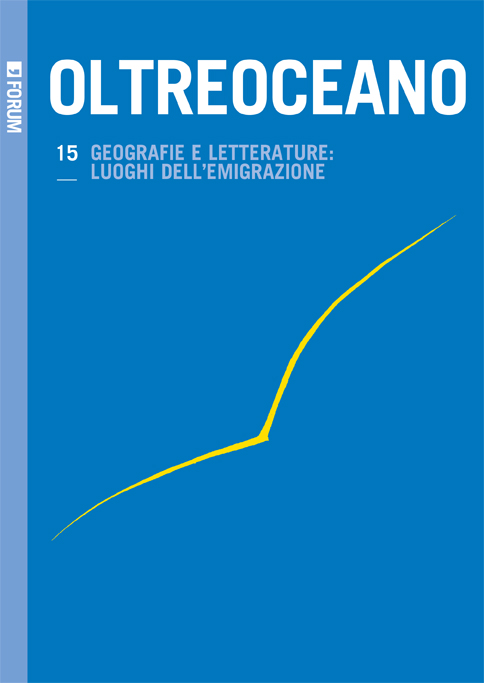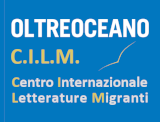Italian Canadian Writing: the Difference a Few Decades Make
Parole chiave:
Ricci, writing, language, Italian-Canadian, identityAbstract
The article explores the changes in the last 40 years both in the language of Canadian ethnic literature itself and in its authors’ self-identifying as Italian Canadian in light of the developments of those years both in ‘identity politics’ and in Canada’s national sense of selfhood. En route it tests the usefulness of various labels used, over time, to identify these writings against the literary corpus produced for almost thirty years now by Nino Ricci, born and raised in Canada, by Italian immigrant parents.
Scrittura italo-canadese: pochi decenni possono fare la differenza
Il contributo analizza i cambiamenti che negli ultimi quaranta anni si sono verificati nel linguaggio, utilizzato per definire la letteratura etnica canadese, e nel modo in cui gli autori si sono identificati come italo-canadesi a fronte sia delle mutate politiche identitarie sia degli sviluppi nel senso nazionale di identità canadese, susseguitisi in quell’arco temporale. Per testare la validità delle varie etichette utilizzate via via per definire tale letteratura, viene esaminato il corpus letterario, ormai trentennale, prodotto da Nino Ricci, scrittore nato e cresciuto in Canada da genitori immigranti di origine italiana.
Downloads
Riferimenti bibliografici
Atwood, M. (1970): The Journals of Susanna Moodie. Toronto: Oxford University.
Baldo, M. (2013): Landscapes of Return: Italian-Canadian Writing Published in Italian by Cosmo Iannone Editore. Translation Studies, 6, 2, pp. 199-216.
Bancheri, S. (Ed.) (2012): Italian Outside of Italy: The Situation in Canada, USA and the English-Speaking World. Toronto: Frank Iacobucci Centre for Italian Canadian Studies.
Burns, J. (2002): Review: Testament by Nino Ricci. Quill and Quire. Retrieved from https://quillandquire.com/review/testament/
Caccia, F. & D’Alfonso, A. (Eds.) (1983): Quêtes: Textes d’auteurs italo-québécois. Montreal: Guernica.
Cho, L. (2007): The Turn to Diaspora. Topia, 17, pp. 11-30.
D’Alfonso, A. & Verdicchio, P. (1998): Duologue: On Culture and Identity. Toronto: Guernica.
De Franceschi, M. (2017): Waiting for Chrysanthemums: A Novel. Montreal: Longbridge Books.
De Franceschi, M. (Ed.) (1998): Pillars of Lace: The Anthology of Italian-Canadian Women Writers. Toronto: Guernica.
De Gasperi, G., Seccia, M. C., Canton, L. & Mirolla, M. (Eds.) (2015): Writing Cultural Difference: Italian-Canadian Creative and Critical Works [E-book, n. p.]. Toronto: Guernica.
Di Cicco, P. G. (1978): Roman Candles: An Anthology of Poems by Seventeen Italo-Canadian Poets. Toronto: Hounslow.
Di Giovanni, C. M. (1984): Italian Canadian Voices: A Literary Anthology, 1946-2004. Oakville: Mosaic.
Di Michele, M. (1980): Bread and Chocolate. Ottawa: Oberon.
Di Michele, M. (1981): Mimosa and Other Poems. Oakville: Mosaic.
Di Michele, M. (2004): Tenor of Love. Toronto: Penguin Canada.
Di Michele, M. (2011): The Flower of Youth: Pier Paolo Pasolini Poems. Toronto: ECW.
Fraser, N. (2000): Rethinking Recognition. New Left Review, 3, pp. 107-120.
Gilman, S. L. (1990): Jewish Self-Hatred: Anti-Semitism and the Hidden Language of the Jews. Baltimore: Johns Hopkins University Press.
Gunew, S. (1994): Forward. In J. Pivato, Echo: Essays on Other Literatures (pp. 7-31). Toronto: Guernica.
Harney, R. (1988): ‘So Great a Heritage as Ours’: Immigration and the Survival of the Canadian Polity. Daedalus, 117, 4, pp. 51-97.
Healey, R. (1988): The Italian Connection: 25 Years of Canadian Literature and Italian translation, 1963-1988. Toronto: Thomas Fisher Rare Book Library.
Hutcheon, L. (1990): The Novel. In W. H. New (Ed.), Literary History of Canada, 4 (pp. 73-96). Toronto: University of Toronto.
Hutcheon, L. (1998): Crypto-Ethnicity. PMLA, 113, 1, pp. 28-33.
Lamberti, E. (2013): Introduction. In L. Canton & C. M. Di Giovanni (Eds.), Writing Our Way Home [E-book, n. p.]. Toronto: Guernica.
Loriggio, F. (1990): History, Literary History, and Ethnic Literature. In J. Pivato (Ed.), Literature of Lesser Diffusion (pp. 21-45). Edmonton: Research Institute for Comparative Literature, University of Alberta.
Loriggio, F. (2012): Italian in Italian Canadian Literature: Preliminary Probes. In S. Bancheri (Ed.), Italian Outside of Italy: The Situation in Canada, USA and the English-Speaking World (pp. 245-271). Toronto: Frank Iacobucci Centre for Italian Canadian Studies.
Minni, D. (Ed.), (1989): Ricordi, Things Remembered: An Anthology of Short Stories. Montreal: Guernica.
Minni, D. & Foschi Ciampolini, A. (Eds.) (1990): Writers in Transition: The Proceedings of the First National Conference of Italian-Canadian Writers. Montreal: Guernica.
Mullen, A. (2004): Neither Here Nor There: Redirecting the Homeward Gaze in Nino Ricci’s Lives of the Saints, In a Glass House, and Where She Has Gone. Canadian Ethnic Studies, 36, 2, pp. 30-50.
Paci, F. (1978): The Italians. Ottawa: Oberon.
Pivato, J. (Ed.), (1985): Contrasts: Comparative Essays on Italian Canadian Writing. Montreal: Guernica.
Pivato, J. (1994): Echo: Essays on Other Literatures. Toronto: Guernica.
Pivato, J. (Ed.). (1998): The Anthology of Italian-Canadian Writing. Toronto: Guernica.
Pivato, J. (1999): The Singing Never Stops: Languages of Italian Canadian Writers. In N. Azzia (Ed.), Floating the Borders: New Contexts in Canadian Criticism (pp. 51-60). Toronto: TSAR.
Pivato, J. (2012): Rejected Languages of Italian-Canadian Authors. In S. Bancheri (Ed.), Italian Outside of Italy: The Situation in Canada, USA and the English-Speaking World (pp. 273-280). Toronto: Frank Iacobucci Centre for Italian Canadian Studies.
Ricci, N. (1990): Lives of the Saints. Toronto: Cormorant Books.
Ricci, N. (1993): In a Glass House. Toronto: McClelland and Stewart.
Ricci, N. (1997): Where She Has Gone. Toronto: McClelland and Stewart.
Ricci, N. (2002): Testament. Toronto: Anchor Canada.
Ricci, N. (2008): The Origin of Species [E-book, n. p.]. Toronto: Doubleday.
Ricci, N. (2009): Extraordinary Canadians: Pierre Elliott Trudeau [E-book, n. p.]. Toronto: Penguin Canada.
Ricci, N. (2015): Sleep [E-book, n. p.]. Toronto: Doubleday.
Ricci, N. (2019): Reviews of The Origin of Species. Retrieved from https://ninoricci.com/book/origin-of-species
Steele, Ch. (Ed.) (1982): Taking Stock: The Calgary Conference on the Canadian Novel. Downsview: ECW Press.
Thien, M. (2016): Do Not Say We Have Nothing: A Novel. Toronto: Alfred A. Knopf Canada.
Ty, E. (2011): Representing ‘Other’ Diasporas in Recent Global Canadian Fiction. College Literature, 38, 4, pp. 98-114.
Downloads
Pubblicato
Come citare
Fascicolo
Sezione
Licenza
Copyright (c) 2019 Oltreoceano - Rivista sulle migrazioni

Questo lavoro è fornito con la licenza Creative Commons Attribuzione - Non commerciale - Condividi allo stesso modo 4.0 Internazionale.
Gli autori si impegnano a rispettare le seguenti condizioni, che s’intendono accettate al momento della sottomissione per la stampa dei propri contributi.
L’invio di un testo implica che esso sia inedito e non in attesa di essere pubblicato altrove.Gli autori si impegnano a rispettare le seguenti condizioni, che s’intendono accettate al momento della sottomissione per la stampa dei propri contributi.
- Qualora venga accettato, l’autore conferisce all’editore il diritto di pubblicarlo e distribuirlo sia in forma cartacea che nell’edizione elettronica in rete. Gli articoli pubblicati saranno scaricabili e resi disponibili in open access.
- Purché segnali correttamente che la prima pubblicazione è avvenuta sulla rivista «Oltreoceano. Rivista sulle migrazioni», l’autore ha facoltà di: a) riprodurre l’articolo in estratti separati o raccolti in volume; b) pubblicare l’articolo nel proprio sito personale o in quello di corsi di insegnamento purché si tratti di siti di natura non commerciale; c) depositare l’articolo in archivi online di carattere non commerciale, legati all’istituzione di appartenenza o come parte di progetti di diffusione non commerciale e open access dei lavori scientifici.
Non è consentita l’utilizzazione dei contributi da parte di terzi, per fini commerciali o comunque non autorizzati. L’editore declina ogni responsabilità sull’uso non autorizzato del materiale pubblicato sulla rivista.













